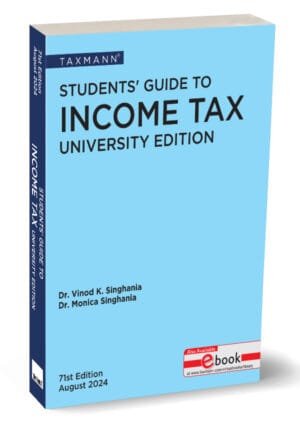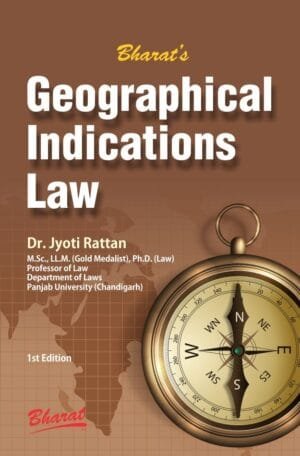Taxmann Financial Markets Institutions & Services By Vinod Kumar
Taxmann Financial Markets Institutions & Services By Vinod Kumar
This book provides a thorough and up-to-date analysis of policy changes and regulatory updates from key authorities such as SEBI, IRDA, and RBI, ensuring that students and readers are well-informed about the latest developments in the financial sector. It is designed to equip students with fundamental knowledge of financial markets and institutions in India.
This book aims to fulfil the requirement of students of undergraduate courses in commerce and management, particularly the following:
- B.Com. (Hons.) Paper DSE 3.2 and B.Com. Paper DSE 5.2 – Aligned with the Undergraduate Curriculum Framework (UGCF) for the University of Delhi.
- Non-Collegiate Women’s Education Board (NCWEB) – Tailored for students of NCWEB.
- School of Open Learning (SOL) – Specifically designed for SOL students at the University of Delhi.
- Various Central Universities – Suitable for commerce and management students across numerous central universities in India.
- BBA/MBA and Other Management Courses – Beneficial for institutions offering courses on the Indian financial system, financial markets, or merchant banking.
The Present Publication is the 3rd Edition, authored by Dr Vinod Kumar & Dr Manmeet Kaur, with the following noteworthy features:
- [What’s New in the 3rd Edition]
- An Introduction to Financial Systems – Inclusion of new indicators of financial markets to provide a foundational understanding
- Money Markets – Introduction of FIMMDA (Fixed Income Money Market and Derivatives Association of India), explaining its role and significance
- Secondary Markets – Expanded coverage of global indices, including detailed explanations of DOW Jones and NASDAQ
- Commercial Banking – Discussion of recent developments such as MUDRA financing, NPAs, the Insolvency and Bankruptcy Code, and initiatives towards financial inclusion
- Venture Capital and Private Equity – Detailed process of screening, regulating, and valuing venture capital
- Financial Stability – New chapter addressing the stages of financial crises and the emerging challenges faced by developing nations
- [Simple & Systematic Manner] The subject matter is presented in a simple and understandable language, making it accessible to students with no prior background in financial markets
- [Updated Content Aligned with UGCF]
- Incorporates the latest theoretical concepts and policy changes introduced by SEBI, IRDA, and RBI
- Reflects recent developments in financial markets and institutions
- [Pedagogical Features] The book features a range of pedagogical tools, such as:
- Learning Outcomes – Each chapter begins with a list of expected learning outcomes, guiding students on what they will achieve after completing the chapter
- Reader-Friendly Language – Theoretical concepts are presented in a simple and accessible manner, making complex topics easier to understand
- Summary Points – Key points and concepts are summarized at the end of each chapter to aid in quick revision
- End-of-Chapter Exercises – These exercises test the reader’s knowledge and help reinforce learning through practice
- [Visual Aids] Difficult concepts are explained with the help of figures, tables, and graphs, enhancing comprehension and retention
- [Practical Real-life Illustrations and Cases]
- Help readers understand the actual workings of money markets, capital markets, banking, and the insurance industry
- Covers a wide range of financial services, including leasing, hire purchase, venture capital, credit rating, and portfolio management services
- [Student-Oriented Book] This book has been developed keeping in mind the following factors:
- Interaction of the author/teacher with their students in the classroom
- Shaped by the author/teacher’s experience of teaching the subject matter at different levels
- Reactions and responses of students have also been incorporated at different places in the book
Contents of this book are as follows:
- An Introduction to Financial Systems
- This chapter lays the foundation by introducing the basics of financial systems and explaining their key components, functions, and significance. It also highlights the crucial role financial systems play in economic development
- Money Markets
- This chapter discusses the various segments of financial markets, distinguishing between capital and money markets. It provides a comprehensive overview of money market instruments, fixed income money markets, and introduces the Fixed Income Money Market and Derivatives Association of India (FIMMDA), explaining its role and significance
- Capital Markets Instruments
- This chapter provides an introduction to capital markets, discussing their importance, the types of instruments used, and the functions and operations within capital markets
- Indian Debt Markets
- Focusing on Indian debt markets, this chapter covers the structure and functioning of debt markets, including discussions on junk bonds and deep discount bonds, providing a thorough analysis of the Indian context
- Primary Markets
- In this chapter, the book explains the role and importance of primary markets within the financial system. It details the processes and mechanisms of primary market operations, highlighting key instruments and entities involved
- Secondary Markets
- This chapter discusses the secondary markets, emphasizing their importance and functions. It also introduces major market indices such as NIFTY, SENSEX, Dow Jones, and NASDAQ, providing detailed explanations of each
- SEBI and Investor Protection
- The role of the Securities and Exchange Board of India (SEBI) is examined in this chapter, focusing on its mechanisms for investor protection, key regulations, and guidelines issued by SEBI to safeguard investors’ interests
- Financial Institutions
- Introducing financial institutions as intermediaries, this chapter analyses their various functions and types. It discusses the significant impact these institutions have on economic stability and growth
- Commercial Banking
- This chapter provides a detailed analysis of commercial banking in India, covering recent developments such as MUDRA financing, Non-Performing Assets (NPAs), the Insolvency and Bankruptcy Code, and the role of technology in banking. It also addresses initiatives towards financial inclusion
- Life and Non-Life Insurance Companies in India
- Offering comprehensive coverage of the insurance sector, this chapter discusses both life and non-life insurance industries in India. It details key players, products, and the regulatory framework governing the sector
- Mutual Funds
- This chapter introduces mutual funds, discussing their significance in financial markets, various schemes and types available in India, and the associated benefits and risks of investing in mutual funds
- Non-Banking Financial Companies (NBFCs)
- Explaining different types of NBFCs, this chapter covers their functions, regulatory aspects, and the challenges they face. It emphasizes the crucial role NBFCs play in the Indian financial system
- Credit Rating
- Focusing on credit rating agencies, this chapter highlights their importance, key players in India, and the processes and methodologies used for credit rating
- Venture Capital and Private Equity
- This chapter provides an in-depth analysis of India’s venture capital and private equity markets. It details the processes involved in screening, regulating, and valuing venture capital, and discusses key players and trends
- Financial Stability
- The final chapter emphasizes the importance of financial stability, discussing its indicators, the impact of global financial crises, and emerging challenges for developing nations. It provides a comprehensive understanding of the need for financial stability in the economic landscape
About the author
Vinod Kumar
Dr. Vinod Kumar is M.Com., M. Phil, Ph.D. DBF (ICFAI), AFP (FPSB). He is NSE certified for capital markets dealers’, derivatives, mutual funds and commodity markets. He is a merit scholarship holder and gold medallist from Delhi School of Economics, Delhi University, for his post-graduation. He is an alumnus of Shri Ram College of Commerce. He has the teaching experience of 40 years teaching graduate and post-graduate students of Delhi University and many of the management institutes of repute. He was Dean and Director of the international college of financial planning for two years. He presented research papers at various national and international universities on financial markets, derivative markets, commodity markets, financial planning, etc. He got an award for the best paper in chartered accountant on reported earnings. He has been conducting workshops for FPSB, NSE, BSE, BNP Paribas and Bajaj Capital on various subjects of financial markets. He is the founder-editor of the investors’ India magazine of Bajaj Capital. He has guided many of the PhD students who have been awarded doctorate qualifications. He is also an associate of the Indian Institute of Advanced Studies, Shimla. He was the coordinator for the e-pathshala (UGC Programme) for financial markets and institutions. He was awarded a major project of UGC for commodity and currency markets inter-relationships submitted in 2013. Dr. Vinod Kumar was the associate professor at SGND Khalsa College, Delhi University. He teaches as guest faculty for M. Com. at Delhi School of Economics (DSE) and Faculty of Management Studies (FMS), Delhi University, Teaching financial markets and investment management, Strategic financial management and managerial finance.
Atul Gupta
Atul Gupta is an Assistant Professor of finance and corporate law in the commerce dept. in Hindu College, the University of Delhi for the last ten years. He has been ex-Deputy Manager in Axis Bank for four years before joining Hindu College. He has vast practical experience in banking and insurance operations and academic experience of 13 years of teaching papers like financial management, corporate law, banking and financial institutions and insurance Management. He has a good number of international and national research papers to his credit. He is NSDL Depository participant diploma certified, AMFI certified for mutual fund, and JAIIB certified in banking operations.
Manmeet Kaur Bawa
Dr. Manmeet Kaur is an Associate Professor of finance in JGLS, O.P. Jindal Global University. She has completed her PhD in Finance from the Faculty of Management Studies, University of Delhi. Her specialization includes corporate governance, financial markets and services, and corporate finance. She has been teaching these subjects at various institutions of the University of Delhi since 2011. She has published articles extensively in various international and national journals in the area of governance and banking. She has also presented many papers in various international and national conferences organized by IIM’s, FMS, and other organizations. She has also authored two books on Financial Markets, Institutions and Services. She has been a resource person at various Faculty Development Programs being conducted for faculty in multi-discipline areas organised by the University of Delhi and other eminent institutions.
| Weight | 0.315 kg |
|---|---|
| bookauthor | Atul Gupta, Manmeet Kaur Bawa, Vinod Kumar |
| binding | Paper back |
| edition | Edition July 2024 |
| hsn | 49011010 |
| isbn | 9789391596279 |
| language | English |
| publisher | Taxmann |
Related products
Original price was: ₹395.₹315Current price is: ₹315.














Reviews
There are no reviews yet.